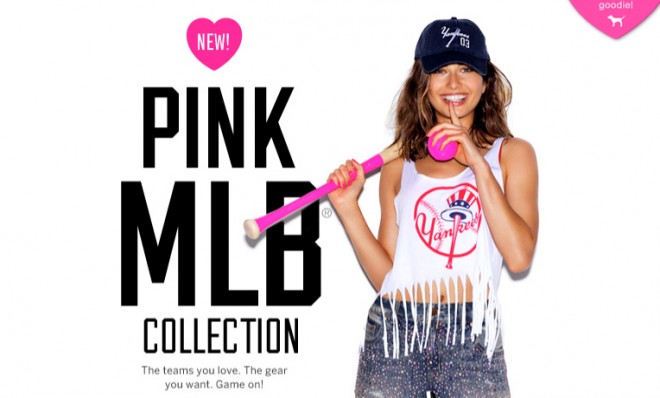Why is everyone shocked Victoria's Secret markets to teenagers?
The company's Pink brand has been targeting the younger set for more than a decade. But it has suddenly found itself in hot water

A free daily email with the biggest news stories of the day – and the best features from TheWeek.com
You are now subscribed
Your newsletter sign-up was successful
It is a truth universally acknowledged that when teenage girls and anything remotely sexual are mentioned in the same sentence, there is bound to be controversy. People were already in a froth about the aggressive sexualization of teenage coeds in Harmony Korine’s Spring Breakers, and now Victoria’s Secret has inadvertently stirred the pot, with Chief Financial Officer Stuart Burgdoerfer admitting that the company markets to teenagers. "When somebody's 15 or 16 years old," he said, "they want to be older, and they want to be cool like the girl in college, and that's part of the magic of what we do at Pink," the company's brand for younger women.
The company has since officially stated that Pink is a "brand for college-aged women," but the Victoria’s Secret line has been openly targeting a younger crowd of female consumers for more than a decade. So the outrage that has greeted Burgoerfer's comments is somewhat surprising. In addition to an online petition asking Victoria’s Secret to "stop sexualizing teens," people have taken to Victoria’s Secret’s Facebook page to suggest the company is part of the "irresponsible culture" that led to the Steubenville rape case.
Many parents are enraged because they feel Victoria's Secret is exploiting their daughters at their most vulnerable age, writes Dr. Christine Carter of UC Berkeley at The Huffington Post. "Bright Young Things," the company's campaign targeting teenagers, teaches them that "slutty is status" and that "boys should objectify girls," says Carter. There’s also the host of body image issues that comes from watching "supermodels in high heels, little girl costumes, and bubble gum underwear on stage with Justin Bieber," a reference to the Victoria’s Secret fashion show in 2012. Carter wants parents’ "righteous anger to go viral," and for them to fight back with boycotts. "As parents, we can protect [children] by not letting them watch commercials and by not letting them shop in (or, frankly, even near) stores like Victoria's Secret."
The Week
Escape your echo chamber. Get the facts behind the news, plus analysis from multiple perspectives.

Sign up for The Week's Free Newsletters
From our morning news briefing to a weekly Good News Newsletter, get the best of The Week delivered directly to your inbox.
From our morning news briefing to a weekly Good News Newsletter, get the best of The Week delivered directly to your inbox.
Hold on, writes Amanda Marcotte at Slate. It's ridiculous to suggest that, "absent the seductive power of a Victoria’s Secret ad over the adolescent mind, high school girls would have reacted with delight when Mom insisted on buying four-packs of Hello Kitty underwear,” says Marcotte. Let’s stop blaming Victoria’s Secret for the fact that teenage girls want to feel sexy. Moreover, the arguments about protecting our daughters' supposed innocence echo the antiquated sentiment that sex "would be the ruin of a generation of girls." Parents and critics need a reality check, says Marcotte, noting the average American has sex by 17 and seven out of ten are sexually active by 19. Teenagers "need this time to experiment" and "there’s no harm giving teenagers a little freedom to do the growing up they need to do."
Tracy Clark-Flory at Salon agrees that we can’t pile hate on Victoria’s Secret for marketing to younger teenagers, but the company's defenders may be missing a larger point. The company and its branding are symptoms, not a cause of, "the way our culture fetishizes youth." Teenage female consumers pick up on that, with or without the help of Victoria’s Secret. "As long as women are celebrated as things, teen girls will celebrate being things," writes Clark-Flory. "That is a problem bigger than Victoria’s Secret is tacky."
A free daily email with the biggest news stories of the day – and the best features from TheWeek.com
Emily Shire is chief researcher for The Week magazine. She has written about pop culture, religion, and women and gender issues at publications including Slate, The Forward, and Jewcy.
-
 How the FCC’s ‘equal time’ rule works
How the FCC’s ‘equal time’ rule worksIn the Spotlight The law is at the heart of the Colbert-CBS conflict
-
 What is the endgame in the DHS shutdown?
What is the endgame in the DHS shutdown?Today’s Big Question Democrats want to rein in ICE’s immigration crackdown
-
 ‘Poor time management isn’t just an inconvenience’
‘Poor time management isn’t just an inconvenience’Instant Opinion Opinion, comment and editorials of the day